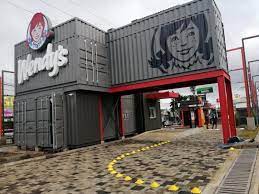
In the ever-evolving landscape of the foodservice industry, restaurants are constantly seeking innovative ways to adapt to changing consumer preferences, technology advancements, and economic challenges. One such innovation that has been gaining momentum in recent years is modular retail. This transformative approach offers a fresh perspective on how restaurants can not only survive but thrive in a rapidly changing world.
In this comprehensive blog post, we will delve into the world of modular retail and explore why restaurants should seriously consider embracing this concept. From enhancing flexibility and efficiency to meeting the evolving demands of consumers, we’ll uncover the compelling reasons why modular retail could be the key to the future success of restaurants.
Flexibility in Space and Location
One of the primary advantages of modular retail for restaurants is the unparalleled flexibility it provides in terms of space and location. Unlike traditional brick-and-mortar establishments, modular retail setups can be quickly assembled and disassembled, allowing restaurants to adapt to various locations and settings. This flexibility is especially valuable in an era where consumers are increasingly seeking unique dining experiences beyond the confines of traditional restaurant spaces.
For example, a restaurant can set up a modular retail space in a bustling urban square during lunch hours and then relocate to a quieter suburban area for dinner service. This adaptability not only increases visibility but also allows restaurants to explore new markets and target different customer demographics with ease.
Reduced Overhead Costs
Running a restaurant can be financially demanding, with high overhead costs including rent, utilities, and maintenance. Modular retail offers an appealing solution by significantly reducing these expenses. Since modular setups are often temporary or semi-permanent, restaurants can avoid long-term leases and the financial burden of maintaining a fixed location.
Furthermore, modular retail spaces can be customized to suit specific needs, eliminating the need for extensive renovations and costly interior design. This reduction in overhead costs allows restaurants to allocate their resources more efficiently, invest in higher-quality ingredients, and experiment with new menu offerings.
Adaptability to Changing Consumer Trends
In today’s fast-paced world, consumer preferences and trends can change rapidly. Restaurants that can’t keep up with these shifts risk losing relevance and customers. Modular retail, however, enables restaurants to pivot quickly and adapt to changing trends.
For instance, if there’s a sudden surge in demand for plant-based or health-conscious options, a restaurant can easily reconfigure its modular retail space to focus on these offerings. This agility ensures that restaurants remain competitive in an industry where innovation is key to success.
Enhanced Customer Experience
Modular retail can revolutionize the customer experience in the world of dining. With the ability to create pop-up restaurants in unique locations or even offer outdoor dining experiences, restaurants can provide customers with memorable and immersive moments.
Imagine enjoying a gourmet meal under the stars on a rooftop pop-up, or savoring local cuisine at a modular retail space set up at a popular food festival. These experiences not only attract diners seeking novelty but also create a strong brand identity and word-of-mouth marketing opportunities.
Sustainability and Eco-Friendliness
As sustainability becomes a central concern for consumers, restaurants must consider their environmental impact. Modular retail can be a sustainable choice, as it often involves repurposing shipping containers or other eco-friendly materials for construction.
Additionally, the flexibility of modular setups means that restaurants can optimize their energy use and reduce waste more effectively. By minimizing their carbon footprint, restaurants can align themselves with the values of eco-conscious consumers and demonstrate a commitment to environmental responsibility.
Cost-Effective Expansion and Experimentation
For restaurant owners looking to expand their brand or experiment with new concepts, modular retail offers a cost-effective and low-risk approach. Rather than committing to a new permanent location or investing heavily in a new concept, restaurants can test the waters through temporary modular setups.
This allows them to gather data, receive customer feedback, and fine-tune their offerings before making more significant investments. It’s a strategic approach that minimizes the financial risks associated with traditional expansion.
Efficient Seasonal Operations
Many restaurants experience seasonal fluctuations in business, with peak and off-peak periods throughout the year. Modular retail is a perfect solution for efficiently managing these fluctuations. During the busy seasons, restaurants can set up additional modular spaces to meet increased demand, and during slower periods, they can scale down operations to reduce costs.
This adaptability ensures that restaurants can maintain profitability throughout the year without overextending themselves or facing financial strain during lean months.
Conclusion
In an industry as dynamic as the restaurant business, adaptability and innovation are crucial for long-term success. Modular retail offers an exciting avenue for restaurants to not only survive but thrive in an ever-changing landscape.
From the flexibility in space and location to reduced overhead costs, adaptability to changing consumer trends, enhanced customer experiences, sustainability, cost-effective expansion, and efficient seasonal operations, the benefits of modular retail for restaurants are abundant.
By seriously considering modular retail as part of their business strategy, restaurants can position themselves as pioneers in the industry, continually delighting their customers and staying ahead of the competition. In doing so, they can ensure their place at the forefront of the future of dining.

